|
|
Roland Hayes (Tenor) |
|
Born: June 3, 1887 - Curryville, near Calhoun, Georgia, USA
Died: January 1, 1977 - Boston, Massachusetts, USA |
|
The American lyric tenor, Roland Hayes, was born in Curryville, Georgia, near Calhoun, to Fanny and William Hayes, who were former slaves. When Hayes was 11 his father died, and his mother moved the family to Chattanooga, Tennessee. He was a singer trained with Arthur Calhoun in Chattanooga as well as at Fisk University in Nashville. As a student he began publicly performing touring with the Fisk Jubilee Singers in 1911. He furthered his studies in Boston with Arthur Hubbard. During his period studying with Hubbard he was a messenger at the Hancock Life Insurance Company to support himself. Then in London he studied with George Henschel and Amanda Ira Aldridge.
Roland Hayes began with arranging his own recitals and coast-to-coast tours from 1916 to 1919. He sang at Craig's Pre-Lenten Recitals and several Carnegie Hall concerts. He made his official debut that year in Boston's Symphony Hall which received critical acclaim. He performed with the Philadelphia Concert Orchestra, and at the Atlanta Colored Music Festivals and at the Washington, D.C. Washington Conservatory concerts. In 1917, he toured with the Hayes Trio which he formed with baritone William Richardson and pianist William Lawrence who was his regular accompanist. His London debut was in April 1920 at Aeolian Hall with pianist Lawrence Brown as his accompanist. Soon Hayes was singing in capital cities across Europe and was quite famous when he returned to the USA in 1923. He was awarded the Spingarn Medal in 1924.
Roland Hayes finally secured professional management with the Boston Symphony Orchestra Concert Company. He is considered the first African American male concert artist to receive wide international acclaim as well as at home. He was reportedly making $100,000 a year at this point in his career. Critics lauded his abilities and linguistic skills with songs in French, German and Italian. He published a collection of spirituals in 1948 as My Songs; Aframerican Religious Folk Songs Arranged and Interpreted.
Roland Hayes is a member of Omega Psi Phi Fraternity. He and his wife Helen Alzada Mann had a daughter, Afrika, in 1933. After Hayes' wife and daughter were thrown out of a Rome, Georgia shoe store for sitting in the white-only section, Hayes confronted the store owner. The police then arrested both Hayes, whom they beat, and his wife. Hayes and his family eventually left Georgia.
In 1982, the University of Tennessee at Chattanooga opened a new musical performance center, the Roland W. Hayes Concert Hall. The concert venue is located at the Dorothy Patten Fine Arts center. The Roland Hayes Committee was formed in 1990 to advocate the induction of Roland Hayes into the Georgia Music Hall of Fame. In 1992, when the Calhoun Gordon Arts Council was incorporated, the Roland Hayes Committee became the Roland Hayes Music Guild and Museum in Calhoun, Georgia. The opening was attended by his daughter Afrika. There is a historical marker located on the grounds of Calhoun High School (Calhoun, Georgia) on the north west corner of the campus near the front of the Calhoun Civic Auditorium. |
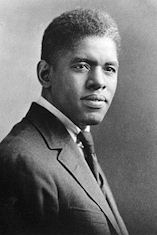
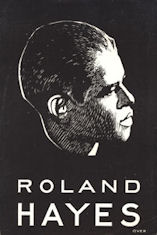
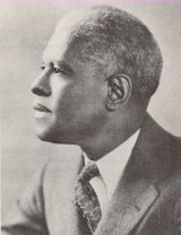
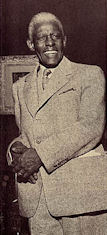
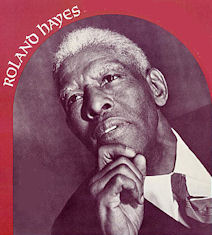
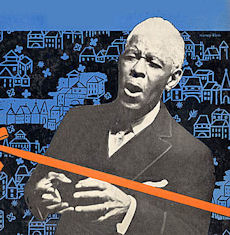
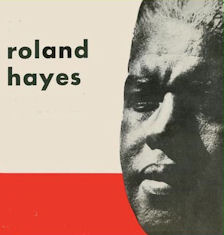
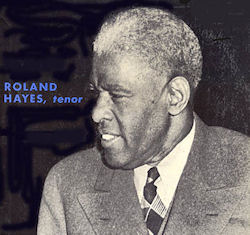
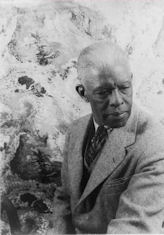
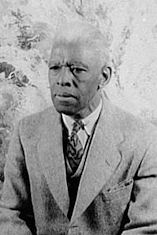 |
|
Source: Wikipedia Website
Contributed by Aryeh Oron (November 2009) |
|
Recordings of Bach Cantatas & Other Vocal Works |
|
Conductor |
As |
Works |
|
Under his name |
Tenor |
BWV 508 |
|
Links to other Sites |
|
Roland Hayes (Wikipedia)
Roland Hayes (Answers.com)
Roland Hayed - Biography (New Georgia Encyclopedia) |
Roland Hayes (Afrocentric Voices in Classical Music)
Roland Hayes Museum Website
The Durbeck Archive: Black Classical Singers (Roland Hayes) |
|
Bibliography |
|
"Beaten in Georgia, Says Roland Hayes: Negro Singer Asserts He and Wife Were Put in Cell after a Store Dispute," New York Times, (July 17, 1942)
Robert C. Hayden: Singing for All People: Roland Hayes, A Biography (1989; reprint, Boston, Mass.: Select Publications, 1995)
MacKinley Helm: Angel Mo' and Her Son: Roland Hayes (Boston, Mass.: Little, Brown, 1942)
Alan Rich: "A Bouncy Seventy-Five: Roland Hayes, Despite His Age, Gives Concerts, Teaches and Reminisces," New York Times, (June 3, 1962)
Charles Walston: "Twenty-Minute Standing Ovation," Atlanta Constitution (June 7, 1992)
Eileen Southern: The Music of Black Americans: A History (W. W. Norton & Company; 3rd edition) |
|
|